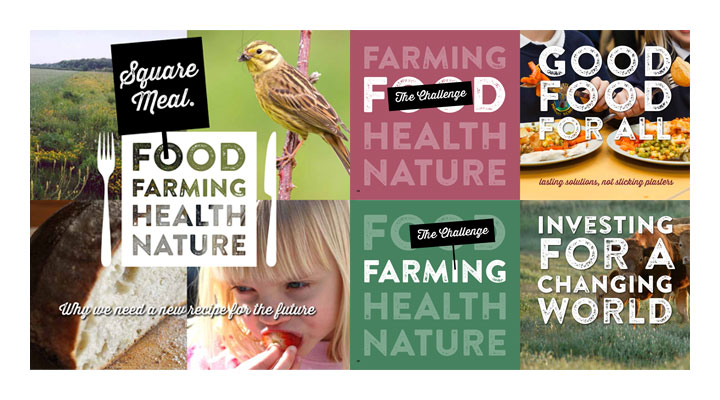Square Meal report calls for fundamental changes in UK food and farming

Ten UK organisations, including the RSPB, the National Trust, the Food Ethics Council, the Wildlife Trusts, and Compassion in World Farming, have come together to challenge future governments to fix our broken food system.
In the Square Meal report – Why we need a new recipe for farming, wildlife, food and public health – they highlight some critical issues and start a conversation that affects us all.
The Pasture-Fed Livestock Association’s deputy chairman John Turner also had some input, and he and some of his cattle appear on page 35!
Starting point
To start, The Square Meal Report focuses on four fundamentally important issues affecting all of our lives:
Improving Health
With 33% of under 18’s in the UK either overweight or obese, there are soaring costs to the NHS due to diet-related ill health. The report calls for more to be done to tackle health inequalities, promote healthier sustainable diets, ensure food and water safety and enable people to reconnect with nature.
Good food for all
Food prices have risen by 12% over the past six years, and more rises are expected.
On 913,138 occasions in the year to the end of March 2014, people in crisis across the UK were provided with three days emergency food by the Trussell Trust alone. Tackling poverty and inequality must be a priority – alongside ensuring transparency, traceability and fairness in supply chains – so that we all see the benefits, from field to fork.
Sustainable Farming
75% of the protein fed to our livestock in the EU is imported. 25% of all UK farmers live in poverty. Investing in a resilient farming system is crucial to securing our food supply in the face of the shocks to the system likely from climate change, rising populations and dwindling resources.
Enhancing Nature:
In less than 50 years we have lost over 44 million pairs of breeding birds. We need to bring back colour to the countryside by protecting the soil upon which we all depend, creating a strong and connected ecological network and championing effective regulation and rural and urban planning policies.
Challenges and changes
In its executive summary, the Square Meal report not only spells out the challenges that we face, but suggests some of the ways in which change is starting to emerge:
Food and farming policy is central to many of the most pressing social, environmental and economic challenges facing UK and global society today and for the future. But these are currently being ignored or addressed in separate and conflicting ways. It is essential that policy-makers attach a much higher priority to food and farming policy than they do at present and that they do it in a much more integrated way.
Increasing numbers of people, from across society, recognise that it is possible for the UK to create better food and farming systems. We already have some good practice to build on which show how to provide all of our citizens with affordable, healthy and environmentally sustainable food; make certain that our farmers and food sector workers are properly rewarded; ensure that a truly progressive UK food and farming sector thrives and grows jobs; and protects, enhances and helps to restore our wildlife and the natural environment.
However, despite the high levels of public subsidies, all too often the wider food system in the UK fails to live up to its enormous potential to deliver for the public good. At its worst, it jeopardises the natural environment, endangers the future security of our food and widens the inequalities in health and access to quality green space. It also places UK farmers in a situation where they are finding it harder and harder to succeed.
The message to politicians at all levels and in all parties is that getting significantly greater public benefit from our wider food and farming systems will require leadership and political will. These challenges need to be addressed as part of an integrated food and farming policy that provides an inspiring and long-term vision, makes these issues inclusive and maps out a pathway to long-term food, environmental and economic security. Such leadership and vision has been lacking for some time.
A “vision” of increased specialisation, increased yields, even bigger ‘big business’ and a bit less environmental damage is not good enough and will come at considerable cost to society.
We need an approach to food and farming policy that provides resilient, vibrant and sustainable rural and urban development. We need an approach that will halt and reverse the decline in all the things that British people love about our countryside: diverse and plentiful wildlife; a varied landscape; farm animals enjoying life out of doors; and fresh, seasonal, local food which can be bought at fair and reasonable prices from the people who produce it. We need an approach that will address the crisis of diet-related obesity and ill health that will reduce the burden of food costs for those on low incomes and will safeguard the basis of future food supplies for everyone.
The solution
There is some good news in all of this. More and more people are producing locally distinctive and delicious food, including right on our doorstep in our towns and cities. Growing numbers of schools and hospitals, restaurants, and cafes, nurseries and universities, are insisting on serving seasonal, local and good-quality food, with higher animal welfare, labour and environmental standards at no extra cost. However, these examples are still the exception and only account for a small proportion of what is consumed each day, because our current system rewards a far more exploitative approach aimed at boosting the volume of exports abroad.
There is also growing recognition that widespread food poverty is simply not acceptable in 21st century UK and that the situation doesn’t need to be like this.
The UK needs to champion food and farming systems that are based on an integrated agro-ecological approach (such as organic or high nature value farming), that are resilient to external shocks and have stepped up to the challenges of climate change, losses of wildlife and diminished functioning of our essential ecosystems.
Our farming and food policy should tackle unfairness and abuse of power in the supply chain, demand transparency and accountability, and be willing to address the damage of UK production and consumption overseas.
Many local initiatives all over the country show that we can restore the quality of what we eat, stop and reverse the growth in obesity, reconnect with nature, bring back butterflies and birds to our countryside and towns, and treat farm animals with decency. We deserve a countryside that is open to everyone and a food system, which is fit for people, protects the environment and provides sustainable livelihoods.
A return to mixed farming?
Market forces have encouraged agricultural specialisation. This is not just about the size of farms but also polarisation and the loss of mixed, rotational farming that has underpinned good soil, crop and animal husbandry for centuries.
Historically, smaller family farms were mixed and the extreme specialisation in both arable and livestock production have left these farms in a position where they are often economically unviable, and certainly an unattractive commercial proposition for the next generation of farming entrants.
This specialisation, concentration on just a few major commodity crops and, in the case of livestock systems, reliance on imported protein has left us with limited diversity, which combined with increasingly unpredictable extremes of weather, leaves our food production vulnerable and lacking resilience
It has become common to use ‘production efficiency’ as a proxy for the environmental footprint of a farm, but the challenges we face will not be addressed by attempts to make a fundamentally unsustainable system produce more without considering either inputs or impacts. This is particularly relevant in systems that rely on high inputs of finite resources, or have large indirect impacts (such as driving land use change in other parts of the world). The way ‘efficiency’ is currently calculated only captures the commodity production output of a system and does not capture the environmental and social benefits or costs of input.
The multifunctional nature of agriculture or the ‘value added’ by farms that more directly connect with the community through independent outlets, diversification and associated initiatives is often overlooked.
We can build a new future for British farming, food and the countryside by:
- Opening up the debate about how public money is spent on farming, food and the countryside, and moving this issue up the agenda. We need to properly engage the wider public and other interested parties such as local communities and those farmers who currently have less political voice. Consumers need to know more about where the money they spend on food goes and decision-makers in Government and business need to be more accountable
- Reconnecting people with where food comes from. Enriching positive attitudes towards valuing food and the natural environment by increasing opportunities to experience, learn about and connect with these issues
- Fully embedding long-termism and environmental sustainability in all aspects of agriculture policy, so public support is not given to damaging systems. Giving more priority to resilience by supporting farming systems such as agri-ecological and organic farming systems, which are less vulnerable to external shocks and are less reliant on external inputs, such as imported protein and fossil-fuel based fertilisers
- Replacing ‘production efficiency’ with ‘system resilience’ as the metric of success. The current approach is based on maximising production with ‘optimal’ use of finite resources and minimising human labour input.
More attention needs to be paid to the use of finite resources and indirect impacts, such as climate change impacts, the land use implications of increasing reliance on cereals in livestock production, and increasing diversity of production to improve resilience within local landscapes and environments. There should not be a ‘one size fits all’ approach.
Read the full report: Square Meal Report July 2014.pdf
Our view
This is a timely report from the organisations involved with the Food Research Collaboration. It calls for the sort of radical changes needed to put our food and farming back on a sustainable path.
The conclusions call for a holistic approach that measures success not solely in terms of the bottom line, but in the broader values that really matter to society.
It considers outcomes as diverse as land use and the sustainable use of finite resources such as fossil fuels, through to sustainable diets and an equitable relationship throughout the entire supply chain. These are all inextricably linked through food and farming webs. Meaningful change will only come about by considering each within the context of the whole.
Pasture-Fed is of course a critical part of the solution.
Three-quarters of the protein-rich feed used in mainstream livestock production is imported into the EU and the impact of that production elsewhere in the world is often associated with land use change and environmental degradation. These are costs that we can no longer afford to remain hidden. We have to start encouraging more benign systems of livestock production.
The report calls for a debate and it is one that must play a more central role as the various political parties start to think about the next election. This is a real opportunity for change and one that we can ill afford to squander.



